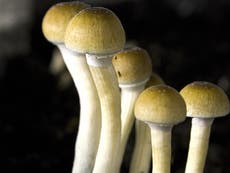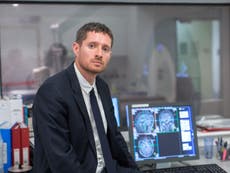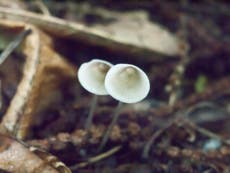Single dose of psilocybin leads to decreased demoralisation and improved spiritual wellbeing among cancer sufferers, long-term research indicates
Harry Cockburn
Tuesday 28 January 2020
A single dose of psilocybin, a compound found in psychedelic mushrooms, can result in “significant improvements” in reducing stress and anxiety in cancer patients for as long as five years after it was administered, a new study suggests.
A research team at New York University‘s Grossman School of Medicine, who were following up a landmark 2016 study into psilocybin, found that in conjunction with psychotherapy, cancer patients experienced improvements in emotional and existential distress.
In the earlier study, the team reported that the use of psilocybin produced “immediate, substantial, and sustained improvements in anxiety and depression and led to decreases in cancer-related demoralisation and hopelessness, improved spiritual wellbeing, and increased quality of life”.
After a follow-up assessment, six-and-a-half months later, psilocybin was associated with “enduring anti-anxiety and antidepressant effects”.
The new study — a long term follow up of the same set of patients — found the positive effects had continued.
“Participants overwhelmingly (71 to 100 per cent) attributed positive life changes to the psilocybin-assisted therapy experience and rated it among the most personally meaningful and spiritually significant experiences of their lives,” the researchers said
“Adding to evidence dating back as early as the 1950s, our findings strongly suggest that psilocybin therapy is a promising means of improving the emotional, psychological, and spiritual wellbeing of patients with life-threatening cancer,” said the 2016 parent study’s lead investigator, Dr Stephen Ross.
“This approach has the potential to produce a paradigm shift in the psychological and existential care of patients with cancer, especially those with terminal illness.”
The researchers said psilocybin could become a useful tool for enhancing the effectiveness of psychotherapy and ultimately relieving these symptoms.
Although the precise mechanisms are not fully understood, scientists believe the drug can make the brain more flexible and receptive to new ideas and thought patterns. In addition, previous research indicates the drug targets a network of the brain, the default mode network, which becomes activated when we engage in self-reflection and mind wandering, and which helps to create our sense of self and sense of coherent narrative identity.
‘Absurd’ magic mushrooms and MDMA are class A drugs, expert tells MPs
In patients with anxiety and depression, this network becomes hyperactive and is associated with rumination, worry, and rigid thinking. Psilocybin appears to acutely shift activity in this network and helps people to take a more broadened perspective on their behaviours and lives.
The follow-up study is the longest-spanning exploration of psilocybin’s effects on cancer-related psychiatric distress to date, the authors say.
“These results may shed light on how the positive effects of a single dose of psilocybin persist for so long,” said Gabby Agin-Liebes, lead author of the long-term follow-up study.
“The drug seems to facilitate a deep, meaningful experience that stays with a person and can fundamentally change his or her mindset and outlook,” she said.
The research is published in the Journal of Psychopharmacology.
Magic mushroom compound psilocybin found safe for consumption in largest ever controlled study
‘Clinically reassuring’ results boost development of psychoactive ingredient as depression treatment, researcher says

Andy Gregory
Wednesday 18 December 2019
The largest controlled study of psilocybin – the psychoactive ingredient in magic mushrooms – has found the compound safe for human consumption, bringing researchers one step closer to developing a psilocybin-based treatment for depression.
Volunteers who received doses of the psychedelic compound experienced no serious adverse effects in phase one clinical trials at Kings College London (KCL).
Psilocybin has been tipped as a potentially groundbreaking treatment for mental health disorders that could replace antidepressants, with some research suggesting it could also aid those dealing with addiction.
“The results of the study are clinically reassuring and support further development of psilocybin as a treatment for patients with mental health problems that haven’t improved with conventional therapy, such as treatment-resistant depression,” said KCL’s Dr James Rucker, the study’s lead investigator.
Most of the minor adverse events recorded were of the expected psychedelic nature, researchers found, with changes to sensory perception and mood, but no negative effects on cognitive and emotional functioning.
The phase one trials – which sought to test the compound’s safety, not its therapeutic value – compared the effects of varying doses of the psilocybin-based drug COMP360 and placebos in 89 healthy volunteers
There were 25 dosing sessions in total. In each session, six participants would receive either 10mg or 25mg doses or a placebo during a one-on-one session with a therapist lasting roughly six hours, with a follow-up period of 12 weeks.
Research by the company behind the trial, Compass Pathways, into using psilocybin as a treatment for depression has been fast-tracked in the US, receiving special “breakthrough therapy” status from the Food and Drug Administration.
Watch more

In patients with anxiety and depression, this network becomes hyperactive and is associated with rumination, worry, and rigid thinking. Psilocybin appears to acutely shift activity in this network and helps people to take a more broadened perspective on their behaviours and lives.
The follow-up study is the longest-spanning exploration of psilocybin’s effects on cancer-related psychiatric distress to date, the authors say.
“These results may shed light on how the positive effects of a single dose of psilocybin persist for so long,” said Gabby Agin-Liebes, lead author of the long-term follow-up study.
“The drug seems to facilitate a deep, meaningful experience that stays with a person and can fundamentally change his or her mindset and outlook,” she said.
The research is published in the Journal of Psychopharmacology.
Magic mushroom compound psilocybin found safe for consumption in largest ever controlled study
‘Clinically reassuring’ results boost development of psychoactive ingredient as depression treatment, researcher says

Andy Gregory
Wednesday 18 December 2019
The largest controlled study of psilocybin – the psychoactive ingredient in magic mushrooms – has found the compound safe for human consumption, bringing researchers one step closer to developing a psilocybin-based treatment for depression.
Volunteers who received doses of the psychedelic compound experienced no serious adverse effects in phase one clinical trials at Kings College London (KCL).
Psilocybin has been tipped as a potentially groundbreaking treatment for mental health disorders that could replace antidepressants, with some research suggesting it could also aid those dealing with addiction.
“The results of the study are clinically reassuring and support further development of psilocybin as a treatment for patients with mental health problems that haven’t improved with conventional therapy, such as treatment-resistant depression,” said KCL’s Dr James Rucker, the study’s lead investigator.
Most of the minor adverse events recorded were of the expected psychedelic nature, researchers found, with changes to sensory perception and mood, but no negative effects on cognitive and emotional functioning.
The phase one trials – which sought to test the compound’s safety, not its therapeutic value – compared the effects of varying doses of the psilocybin-based drug COMP360 and placebos in 89 healthy volunteers
There were 25 dosing sessions in total. In each session, six participants would receive either 10mg or 25mg doses or a placebo during a one-on-one session with a therapist lasting roughly six hours, with a follow-up period of 12 weeks.
Research by the company behind the trial, Compass Pathways, into using psilocybin as a treatment for depression has been fast-tracked in the US, receiving special “breakthrough therapy” status from the Food and Drug Administration.
Watch more

Magic mushrooms ‘could be replacing antidepressants within five years’
It is currently running phase two studies across Europe and North America involving 216 patients who suffer with depression that hasn’t responded to treatment.
“This study is part of our overall clinical development programme in treatment-resistant depression,” Compass Pathways’ co-founder Dr Ekaterina Malievskaia said.
“We wanted to look at the safety and tolerability profile of our psilocybin, and to look at the feasibility of a model where up to six one-to-one sessions are held at the same time.
“We are focused on getting psilocybin therapy safely to as many patients who would benefit from it as possible [and] are grateful to the many pioneering research institutions whose work over the years has helped to demonstrate the potential of psilocybin in medicine.”
In June, The Independent reported that participants in the first trial comparing psilocybin to antidepressants at the world’s first psychedelic research centre, at Imperial College London, described a cathartic emotional “release” and “reconnection” during psilocybin therapy.
As the study’s lead Dr Robin Carhart-Harris pointed out, this is the polar opposite of antidepressants, which patients often complain leave their emotions “blunted”.
It is currently running phase two studies across Europe and North America involving 216 patients who suffer with depression that hasn’t responded to treatment.
“This study is part of our overall clinical development programme in treatment-resistant depression,” Compass Pathways’ co-founder Dr Ekaterina Malievskaia said.
“We wanted to look at the safety and tolerability profile of our psilocybin, and to look at the feasibility of a model where up to six one-to-one sessions are held at the same time.
“We are focused on getting psilocybin therapy safely to as many patients who would benefit from it as possible [and] are grateful to the many pioneering research institutions whose work over the years has helped to demonstrate the potential of psilocybin in medicine.”
In June, The Independent reported that participants in the first trial comparing psilocybin to antidepressants at the world’s first psychedelic research centre, at Imperial College London, described a cathartic emotional “release” and “reconnection” during psilocybin therapy.
As the study’s lead Dr Robin Carhart-Harris pointed out, this is the polar opposite of antidepressants, which patients often complain leave their emotions “blunted”.

No comments:
Post a Comment